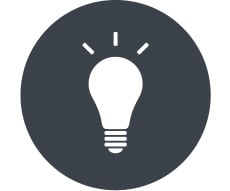The eight key learning outcomes
Our graduate learning outcomes describe the knowledge and capabilities graduates have acquired and can demonstrate at the completion of their course.
Outcomes are specified at the course level, mapped to course components and are assessed. In professionally-accredited courses, learning outcomes are aligned to the relevant professional body.
GLO1 Discipline-specific knowledge and capabilities

Discipline-specific knowledge and capabilities: appropriate to the level of study related to a discipline or profession
Discipline-specific knowledge can be defined as a set of understandings that is more granular than broad knowledge of a field. It's the sort of knowledge that's specific to the discipline or profession and defines a specialist in the area.
Possessing discipline-specific knowledge and capabilities associated with one's degree is crucial in order for graduates to have firm foundations in their chosen profession.
GLO2 Communication

Communication: using oral, written and interpersonal communication to inform, motivate and effect change
Communication is the fundamental generic skill that's required to gain employment. It's also needed to engage in professional written, oral and interpersonal communication with colleagues, employers and managers, clients, the media and the general public.
There are many elements to communicating effectively that individuals need to consider when entering into some kind of communicative interaction. Some of the elements specific to oral, written and interpersonal communication are listed below.
Oral communication
- Empathy
- Engagement with audience
- Responding to questions from the audience
- Tone of voice
- Eye contact
Written communication
- Text type (e.g. report, case study, essay, reflective piece, annotated bibliography etc.)
- Structuring of the argument (usually presented as one main idea with supporting evidence for each predicate)
- Appropriate level of detail within document (e.g. presentation of supporting evidence, referencing system)
- Adherence to reference conventions (Harvard, APA, Vancouver etc.)
Interpersonal communication
- Emotional intelligence
- Body language
- Posture
- Sensitivity to the audience demonstrated through appropriate behaviour
- Active listening
GLO3 Digital literacy

Digital literacy: using technologies to find, use and disseminate information
Digital literacy is defined as using technologies to find, use and disseminate information. Digital literacy is a key 21st-century skill for employment and all aspects of life.
With digital media sources used every day as part of life and work, the volume, choice, range and complexity of information can be overwhelming. This then can lead to poor selection of sources and time wasted on re-tracing materials.
Navigation skills and information management can ensure that up-to-date, relevant sources are used, and are well organised and documented. The sheer volume of digital media means that synthesis and the critical assessment of a diverse array of resources are also key skills.
Digital literacy skills also impact students' employability, with recruitment being increasingly undertaken via social media and a professional digital identity being key to future networking within a profession, seeking opportunities and ensuring mobility over a career.
GLO4 Critical thinking

Critical thinking: evaluating information using critical and analytical thinking and judgment
Critical thinking is a transferable skill needed in every career. Analysing problems identifies important factors and variables. Evaluation of information requires judgement of the relative importance and impact of factors.
During their studies, students will need to draw on critical thinking for assessments and to develop their learning.
Critical thinking will enable students to make an informed evaluation of knowledge, developing skills as an individual learner and gradually decreasing their reliance on university resources. This type of critical thinking, when integrated with current knowledge, can lead to the creation of new knowledge.
Steps of critical thinking:
1. Reflect
2. Question
3. Contextualise
4. Evaluate
5. Analyse
6. Observe
Critical thinking is fundamental to scholarly work. Universities have always undertaken to teach these skills in some form or to some degree.
Applying the critical thinking process to tasks that provide students with a clear context (for example, future workplace) can assist their analysis. This would include:
- written essays
- analysing a problem within the workplace
- problem-based learning
- case studies
- simulations
- work integrated learning through placement or practicum.
GLO5 Problem solving

Problem solving: creating solutions to authentic, real world and ill-defined problems
A well-developed disposition towards strategic problem solving is a highly valued graduate attribute for prospective employers in a diverse and changing world. Problem-solvers are quick to adapt to change and can incorporate new perspectives.
Some examples of the characteristics of a good problem solver include being:
- innovative
- creative
- objective
- unbiased
- open minded
- courageous
- risk taker
- reflective
- evaluator
- flexible
- multi-skilled
- versatile
- motivated
- engaged
- open to challenge.
GLO6 Self-management

Self-management: working and learning independently, and taking responsibility for personal actions
The self-management outcome is defined as working and learning independently and taking responsibility for personal actions.
Self-management encompasses complex skills and understandings that develop individual competence towards self-guidance, training, opportunity and experience.
Self-management means demonstrating application of knowledge and skills by showing:
- initiative and judgement in planning, problem solving and decision making in professional practice or in situations that require self-directed learning
- responsibility and accountability for their own learning and professional practice (and in collaboration with others) within broad parameters
- independent learning, and how to adapt what you know and continue to learn to new problems.
GLO7 Teamwork

Teamwork: working and learning with others from different disciplines and backgrounds
Teamwork is essential for life-long learning and problem solving, to develop shared understandings and bring together diverse talents and disciplines. Successful teams recognise and use complementary skills and knowledge and collaborate.
Learning how to work together as a team is important for students because:
- teamwork enables students to bring their ideas together, leading to more creative thinking and enabling them to find solutions to problems
- teamwork activities develop management skills among students, such as organisational and communication skills
- teamwork activities can accommodate different personality types and ability levels among team members
- teamwork develops lifelong learning skills that will be desirable attributes for future employment
- people take on different roles in the workforce and an understanding of preferred ways to contribute to a team is crucial for succeeding at work.
GLO8 Global citizenship

Global citizenship: engaging ethically and productively in the professional context, and with Aboriginal and Torres Strait Islander peoples as well as diverse communities and cultures in a global context
Global citizenship describes a way of thinking, acting, relating and responding to socio-cultural elements. It's based on understanding the 'self' in relation to 'others' within the local and broader community and discipline.
Features of global citizenship
Global citizenship is the ability to:
- develop a worldview – process local information and compare this to other situations and use this for knowledge building
- research, drawing on local and international perspectives
- understand the interdependency of events/situations/issues and conditions from a local and global perspective
- adapt knowledge and understandings to particular environments and situations
- critically analyse issues and situations, taking into account global perspectives
- show curiosity for understanding different cultural perspectives
- develop a sense of community and communities
- develop an appreciation of the importance of inclusivity, and draw on this to collaborate with others in a positive, ethical and engaged manner
- identify challenges to inclusivity and have strategies to deal with these
- participate in civic-focused activities (these can be reflected through university life, work-integrated learning activities etc.)
- demonstrate an understanding of self and local culture in relation to interacting with/learning about other cultures/selves etc.
- understand ethical community behaviour, especially as defined by the discipline being studied.
